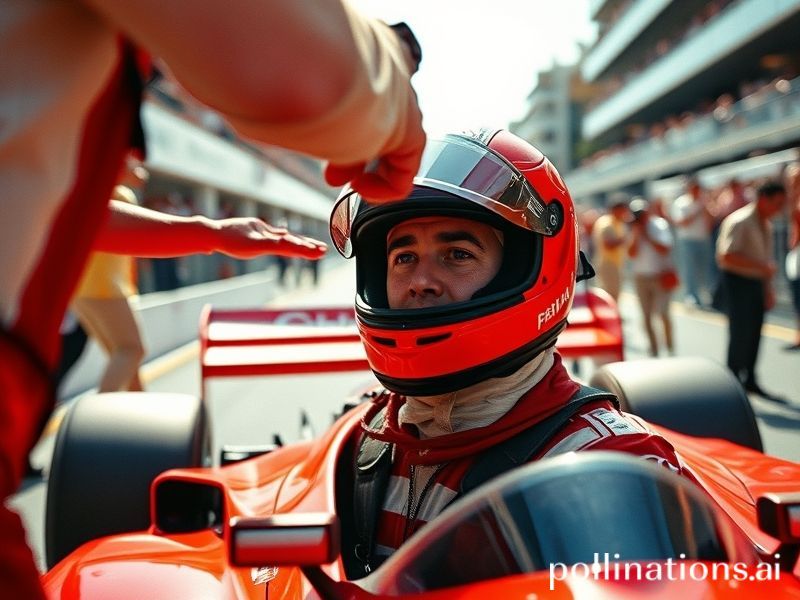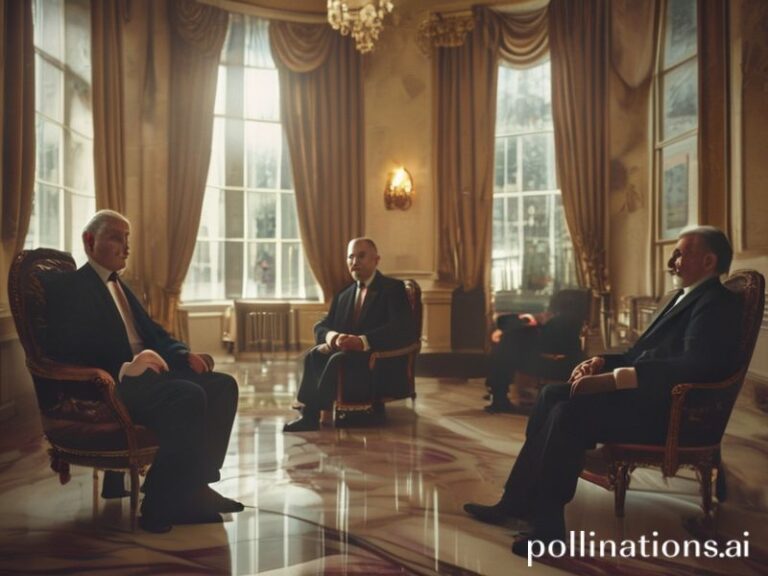Carlos Gu: The Man Who Turned Quantum Hype into Global Policy (And Other Bedtime Stories for Investors)
Carlos Gu and the Glorious Farce of Global Tech Ambition
By Dave’s Locker International Desk
Somewhere between a WeWork in Shenzhen and a Palo Alto juice bar that charges extra for “hope,” the name Carlos Gu began circulating last month with the quiet inevitability of a tax hike. To most of the planet—i.e., anyone outside a 12-block radius of venture-capital oxygen bars—Carlos Gu remains a polite shrug. Yet the ripple he’s sending through supply chains from Rotterdam to Reykjavík is a textbook lesson in how the modern world turns gossip into GDP.
Who, then, is this Gu fellow? Officially, he is the 34-year-old founder and self-styled “Chief Quantum Heretic” of FluxQuark, a Singapore-registered, Delaware-domiciled, Cayman-funded start-up that promises to “democratize topological qubits using artisanal blockchain.” Translation: no one knows what it does, but SoftBank just wired another nine figures to find out. His résumé lists stints at MIT, Tsinghua, and a six-month “sabbatical” at Burning Man, which in today’s economy counts as post-doctoral research in advanced networking.
International significance arrived the moment the European Commission realized that the only source for FluxQuark’s proprietary cryo-gallium substrate is a single factory in Ostrava currently powered by—this is not a joke—recycled Soviet-era coal. Overnight, Brussels’ Green Deal architects discovered a sudden, philosophical flexibility toward Eastern European soot. Meanwhile, the Biden administration’s CHIPS Act office, still high on its own semiconductor fumes, rushed to classify Gu as a “strategic ambiguity partner,” a bureaucratic term meaning “we might ban him next week but want co-authorship on any patents first.”
From a geopolitical standpoint, Carlos Gu is less a person than a floating variable in everyone’s favorite equation: (National Security) × (Market Cap) ÷ (Moral Flexibility) = Outcome. Beijing watches him like a hawk that’s learned to read cap tables; Washington treats him as Schrödinger’s dissident—simultaneously a freedom-loving innovator and a potential sanctions violation—while Brussels files antitrust paperwork in triplicate just in case he ever sells a phone charger in Luxembourg.
The human comedy deepens when you consider the workforce. FluxQuark employs 1,200 engineers across four continents, each receiving equity denominated in “quarkoins,” a token whose white paper contains the line “value accrues through collective belief.” In other words, employees are paid in vibes. Remarkably, this arrangement has not triggered a single labor revolt—proof that stock options remain history’s most effective opiate. HR calls it “mission-driven compensation”; Karl Marx would have called it late-stage farce.
Then there are the customers— or rather, the “beta ecosystem partners,” because no one actually buys anything yet. Fortune 500 companies have formed an orderly line to sign memoranda whose sole enforceable clause is an NDA promising not to read the other clauses. The press releases are masterpieces of recursive nonsense: “Ford to explore quantum-enabled logistics with FluxQuark, unlocking synaptic efficiencies at planetary scale.” Translation: an intern will download a slide deck.
Still, the world keeps spinning on Carlos Gu’s axis. Container ships reroute to accommodate rumored gallium shortages. Energy traders price lattices of probabilistic carbon credits. Even the International Olympic Committee, never one to miss a branding opportunity, floated the idea of a “Quantum Medal” awarded to whoever collapses a wave function on live television. Viewers would vote via NFT, naturally.
So what does it all mean? Simply this: in the 21st century, influence is no longer measured in armies or oilfields but in PowerPoint slides that can spook the global economy faster than you can say “Series C.” Carlos Gu has weaponized ambiguity with such finesse that entire governments now choreograph policy around his GitHub commits. If that sounds dystopian, console yourself with the knowledge that every previous era had its own charlatans—only theirs couldn’t accidentally crash the Taiwanese dollar with a tweet.
In the end, Carlos Gu may succeed, fail, or simply pivot to artisanal kombucha. The punchline remains the same: we, the interconnected masses, will keep refreshing our feeds for the next update, half-terrified, half-thrilled, like passengers on a flight where the pilot keeps asking Reddit for landing advice. Fasten your seatbelts, dear readers; the turbulence is sponsored by SoftBank.







